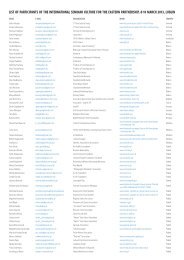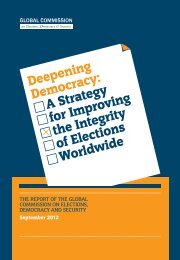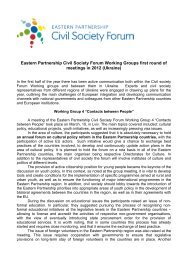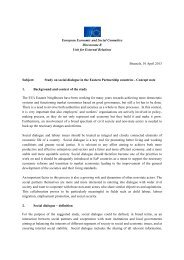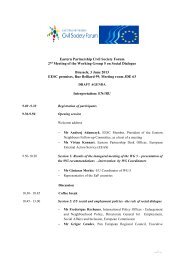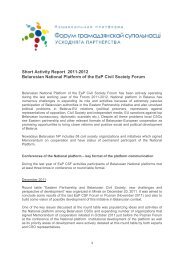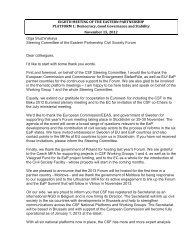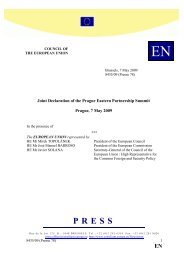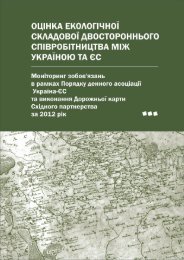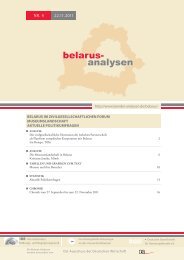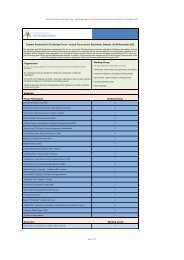Non-formal education - Eastern Partnership Civil Society Forum
Non-formal education - Eastern Partnership Civil Society Forum
Non-formal education - Eastern Partnership Civil Society Forum
Create successful ePaper yourself
Turn your PDF publications into a flip-book with our unique Google optimized e-Paper software.
With respect to the concept of non-<strong>formal</strong> <strong>education</strong> of adults and of the sense that it is embedded<br />
in a generally recognized international context, Belarus has for more than twenty years of post-Soviet<br />
transformation of the state become very cautious steps. At present there is no coherent concept of adult<br />
<strong>education</strong> to meet those global changes that are taking place not only in the world, but also neighbors<br />
in this area. Although the government declares that the main capital of the countryis educated and<br />
intellectually developed people, it continues to move largely in line with the old Soviet tradition, trying to<br />
adapt traditional forms and structures of the <strong>education</strong> system to newchallenges, but not always, or not<br />
enough it takes into account the global trends and the real needs of citizens.<br />
The term “non-<strong>formal</strong> adult <strong>education</strong>”, despite its presence in many major international instruments 5 ,<br />
has not been fixedin the Code of Educationof 2011. Article 240 of the Code refers only to the system<br />
of additional <strong>education</strong> of adults, in which it is defined as “... a kind of further <strong>education</strong>, professional<br />
development aimed at the listener’s and trainee’s satisfaction of their cognitive needs” 6 .<br />
In general, it should be noted that the focus of the current “legal field” of adult <strong>education</strong>is, above<br />
all, on the state <strong>education</strong>al institutions and structures of additional <strong>education</strong>, which are mainly focused<br />
on the development of professional knowledge, skills upgrading and retraining. Other providers of<br />
<strong>education</strong>al services, particularly in the area of non-<strong>formal</strong> adult <strong>education</strong>, only await the fate of “the<br />
other” and still have relative freedom to realize their <strong>education</strong>al services.<br />
At the same time, the draft of the “Concept of the State Program of Additional Adult Education for<br />
2012-2016” states, “There is not normative and legal regulation of the <strong>education</strong>al activities of other<br />
organizations and individual entrepreneurs who, in accordance with the laws of the right to carry out<br />
<strong>education</strong>al activities in the system of additional <strong>education</strong> of adults, as well as there is neither system<br />
of providing statistical reports, no the procedure for passing the certification of students.” 7 One can only<br />
assume what prospects in case of filling this legal “vacuum” is expectedin the near future of the “other”<br />
provider sofnon-<strong>formal</strong>adult <strong>education</strong> (primarily from the non-commercial and non-profit sector). Both<br />
optimistic and pessimistic scenarios are possible.<br />
This fact indicates different emphasis in the attitudes and beliefs that characterize the modern non<strong>formal</strong><br />
<strong>education</strong> in Belarus. On the one hand, there is a pronounced trend of the State to determine the<br />
“rules of the game” in the field of additional <strong>education</strong> of adults, particularly in the traditional segment<br />
(the training and retraining of employees), and on the other hand, we can talk about the development of<br />
non-<strong>formal</strong> adult <strong>education</strong> as services, designed to meet the needs of the population, including marketbasedrelations.<br />
Here, non-<strong>formal</strong> <strong>education</strong> is the most flexible and “responsive” manner to changing<br />
situations. In this case, non-<strong>formal</strong> <strong>education</strong> can carry and promote new values, life style, and thus be<br />
engaged in social change.<br />
The emphasis on performance of a function of non-<strong>formal</strong> <strong>education</strong> in modern Belarus is associated<br />
with the current challenges in the field of quality of life. In turn, the quality of life is also reflected in a<br />
variety of indicators: it is the availability of different kinds of goods, the rights of citizens, the presence of<br />
different perspectives in the social and public life, including citizens in the decision making process 8 .<br />
The European Union Memorandum on Lifelong Learning in 2000 emphasizes that non<strong>formal</strong><strong>education</strong><br />
is anequal partof the <strong>education</strong>al life long process 9 . Since the second half of the<br />
5<br />
For example, the final declaration of the “Using the opportunities of <strong>education</strong> and adult <strong>education</strong> for a viable future.<br />
Belém Framework for Action”UNESCO-Sixth International Conference on Adult Education CONFINTEA VI, Belem / Brazil:<br />
“Adult learning and <strong>education</strong> are a critical measure, which is necessary in response to the challenges we face. Adult learning<br />
and <strong>education</strong> are a key component of a holistic and comprehensive system of <strong>education</strong> and training throughout life, which<br />
includes <strong>formal</strong>, non-<strong>formal</strong> and in<strong>formal</strong> learning and which directly or indirectly is for both young and adult learners. Adult<br />
learning and <strong>education</strong> in the long run are related to ensuring the conditions and processes of learning that are attractive and<br />
the needs of adults as active citizens. They are associated with the development of an independent, autonomous individuals,<br />
creation and restructuring of their lives in complex and rapidly changing cultural, social and economic conditions – at work, in<br />
the family, community and society.”<br />
6<br />
Access mode: http://www.pravo.by/main.aspx?guid=3871&p0=hk1100243&p2={NRPA}<br />
7<br />
The “Concept of the State Program of Continuing Adult Education for 2012-2016.”Access mode: http://edu.gov.by/ru/<br />
main.aspx?guid=17771<br />
8<br />
Materials of a roundtable “Improving of non-<strong>formal</strong> <strong>education</strong> can promote development of the quality of life of Belarusians”<br />
// Адукатар. №2 (16), 2009. – С. 6.<br />
35



